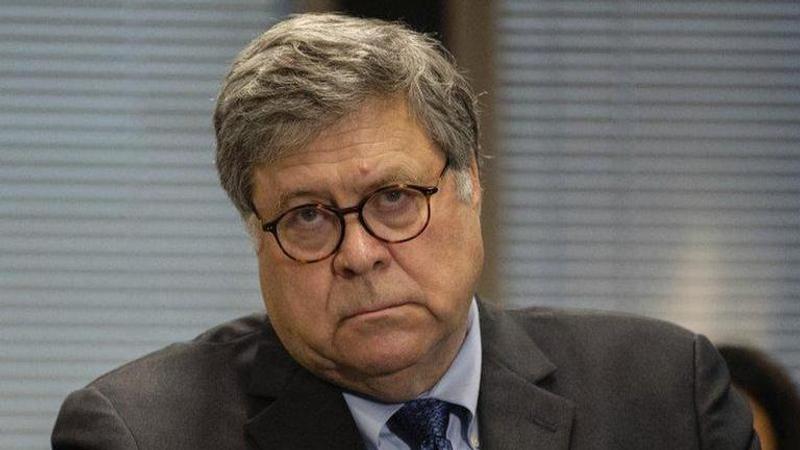Published 12:59 IST, September 10th 2020
Justice Dept. push into Trump case could prompt dismissal
Attorney General William Barr on Wednesday defended the Justice Department's move to intervene in a defamation lawsuit against President Donald Trump, even as experts were deeply skeptical of the federal government's effort to protect the president in a seemingly private dispute.

Attorney General William Barr on Wednesday defended the Justice Department's move to intervene in a defamation lawsuit against President Donald Trump, even as experts were deeply skeptical of the federal government's effort to protect the president in a seemingly private dispute.
The Justice Department’s action is “a normal application of the law. The law is clear. It is done frequently," Barr said at an unrelated news conference in Chicago.
He added, “The little tempest that is going on is largely because of the bizarre political environment in which we live.”
But experts said it's far from clear that the conduct at issue — whether Trump defamed E. Jean Carroll, a writer who accused him of raping her at a New York luxury department store in the 1990s — has anything to do with his White House duties. The department's move is likely to have an ancillary benefit for Trump in delaying the case, but administration lawyers have a tough task at hand trying to argue that the president was acting in his official capacity when he denied Carroll's allegations last year, experts say.
“I wouldn’t make such an argument, and if a president approached me, I would say, ‘Don’t,’” said Stuart Gerson, who led the Justice Department’s Civil Division in President George H.W. Bush’s administration when Barr was attorney general for the first time.
“The president gets sued all the time and is defended by the federal government,” Gerson added, “but those are for lawsuits that have to do with actions in his official capacity as the president. This isn't anything like that.”
The Justice Department's action is consistent with the expansive view of executive authority it has taken under Barr and with its practice of taking legal positions benefiting the president's personal interests, including asking the Supreme Court just last month to allow him to block critics from his Twitter account . It is likely to deepen concerns from critics that the country's chief law enforcement officer is functioning as a personal lawyer for the president, which Barr has adamantly denied.
In the Carroll case , the stakes are especially significant since a move to transfer the lawsuit from state to federal court could not only delay it but also lead to its dismissal. The move, if allowed, could put the American people on the hook for any money she might be awarded. But it could also open the door to the case being thrown out since federal courts have not historically permitted defamation claims against federal employees acting in their official capacity.
Barr cited the Westfall Act, which enables the Justice Department to be substituted as a defendant when federal employees are sued in state court for actions taken as part of their job and for the case to be transferred to federal court, where recovery of damages could be more difficult. For instance: the defense of a lawsuit against a postal worker who clips a car on a daily delivery route could be taken over by the federal government since the collision involved the mailman's official duties.
He pointed to the Justice Department's defense more than a decade ago of Rep. Cass Ballenger, R-N.C., who was sued for defamation by an American Muslim civil rights group. A judge dismissed the case, ruling that Ballenger made the comments in his official capacity.
Legal experts say it's certainly not unusual for the federal government to seek to take over a state lawsuit against a federal employee, as the department is trying to do here.
But that doesn't resolve the question of whether the president was acting in the scope of his official duties when he is alleged to have defamed Carroll, nor is it clear that the same lawsuit protections covering federal employees under the Westfall Act also extend to the president, said Stephen Vladeck, a University of Texas law professor.
“If it's so clear and obvious and normal a case, why did DOJ wait so long” to get involved, he said. “If it was as routine as the attorney general wants us to believe, they would have filed the certification (to take over the case in federal court) the day after the lawsuit was filed.”
Despite the “suspicious” timing, Vladeck said, the actual arguments the department is advancing are not frivolous and are “not open and shut in either direction.”
James Pfander, a Northwestern University professor, said Trump might consider it a win just getting the case moved from state to federal court, “where things might slow down and a judge more sympathetic to the president's claims might be presiding.”
Vladeck agreed, saying “Trump wins even if he loses" since the Justice Department's abrupt intervention two months before the election effectively slows the case down just as Trump was about to be required to produce documents, sit for a deposition and provide a DNA sample.
“The best case scenario is this move leads to the dismissal of the lawsuit," Vladeck said, “The worst case scenario is Trump is no worse off six months from now than he is today.”
Updated 12:59 IST, September 10th 2020




